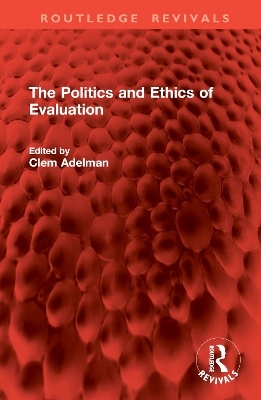
The Politics and Ethics of Evaluation
Seiten
2024
Routledge (Verlag)
978-1-032-82479-6 (ISBN)
Routledge (Verlag)
978-1-032-82479-6 (ISBN)
First published in 1984, this book considers, from the vantage point of the authors considerable experience of a wide range of evaluation, the ways in which they, and others, have coped with ethical and political problems that inherently arise during the evaluation process, particularly that of the responsive or democratic type.
First published in 1984, The Politics and Ethics of Evaluation considers, from the vantage point of the authors’ considerable experience of a wide range of evaluation, the ways in which they, and others, have coped with ethical and political problems that inherently arise during the evaluation process, particularly that of the responsive or democratic type. It looks at the evaluator’s claim to independence and how this is qualified by his relationship to his subject and to various other audiences.
The ethical and political problems of evaluation are discussed from the different perspectives of moral philosophy, sociology, the politics of organisations, curriculum development, and institutional evaluation. Also included is a chapter detailing English law and legal judgements pertaining to qualified privilege, libel and defamation of character. Guidelines for conducting independent evaluation conclude the volume. This book will be of interest to students and researchers of higher education, curriculum studies and ethics.
First published in 1984, The Politics and Ethics of Evaluation considers, from the vantage point of the authors’ considerable experience of a wide range of evaluation, the ways in which they, and others, have coped with ethical and political problems that inherently arise during the evaluation process, particularly that of the responsive or democratic type. It looks at the evaluator’s claim to independence and how this is qualified by his relationship to his subject and to various other audiences.
The ethical and political problems of evaluation are discussed from the different perspectives of moral philosophy, sociology, the politics of organisations, curriculum development, and institutional evaluation. Also included is a chapter detailing English law and legal judgements pertaining to qualified privilege, libel and defamation of character. Guidelines for conducting independent evaluation conclude the volume. This book will be of interest to students and researchers of higher education, curriculum studies and ethics.
Clem Adelman, at the time of this publication, was a Research Co-ordinator at Bulmershe College of Higher Education, Reading, UK.
Introduction: the Ethics of Evaluation 1. Confidentiality and the Right to Know 2. Methodology and Ethics 3. Handling Value Issues 4. Understudy – Evaluator Seeks Authors 5. Negotiating Conditions for Independent Evaluators 6. Evaluation: A Case of Research in Chains 7. Evaluating Curriculum Evaluation Guidelines I: Principles and Procedures for the Conduct of an Independent Evaluation Guidelines II: What Can be Said; What Must be Said
| Erscheinungsdatum | 22.08.2024 |
|---|---|
| Reihe/Serie | Routledge Revivals |
| Verlagsort | London |
| Sprache | englisch |
| Maße | 156 x 234 mm |
| Gewicht | 390 g |
| Themenwelt | Sozialwissenschaften ► Pädagogik ► Allgemeines / Lexika |
| Sozialwissenschaften ► Pädagogik ► Bildungstheorie | |
| ISBN-10 | 1-032-82479-4 / 1032824794 |
| ISBN-13 | 978-1-032-82479-6 / 9781032824796 |
| Zustand | Neuware |
| Haben Sie eine Frage zum Produkt? |
Mehr entdecken
aus dem Bereich
aus dem Bereich
Einführung in die Theorie transformatorischer Bildungsprozesse
Buch | Softcover (2023)
Kohlhammer (Verlag)
34,00 €
eine handlungsorientierte Einführung
Buch | Softcover (2023)
Kohlhammer (Verlag)
36,00 €


